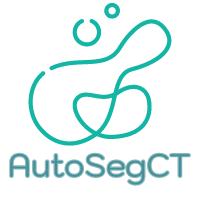Radiotherapy Auto Segmentation
Single application for all in-house auto-segmentation contours
Modality:
Radiotherapy planning CT
Pathology:
Cancer
Status:
Current

CSC Lead: Anil Mistry and Tom Roberts
Clinical leads: Christopher Thomas, Teresa Guerrero Urbano, Ben Taylor
Rationale:
AI auto-contouring tools have improved dramatically in the last few years, and all major treatment planning system vendors are investing in this technology along with independent start-ups and NHS Trusts [NICE, 2023].
GSTT is in a strong position to develop an in-house auto-contouring pipeline using the AI expertise within Radiotherapy physics, clinical oncology, and the CSC team, strong links with King’s College London (KCL) academics and outputs from three KCL PhD students creating AI auto-contouring models.
Segmentation models have been created as output of the extensive research activity generated from Guy’s Cancer Centre. This application will integrate the following models for evaluation in routine clinical care.
- Pelvis Model - Christopher Thomas
- Rectum, Sigmoid, Bowel, Bladder
- Prostate Model - Maram Alquarni
- Prostate, Rectum, Penile Bulb, Bladder, Femoral Head Left, Femoral Head Right
- BowelSpace model - Christopher Thomas
- Bowel space
- Head&Neck Model - Tom Young
- TBC
TotalSegmentator
In addition, the open source CT segmentation model Totalsegmentator(v2) provides 117 structures which could be clinically useful. The TotalSegmentator structures will be include in the generated structure for clinical evaluation on a site by site basis.
- Wasserthal, J., Breit, H.-C., Meyer, M.T., Pradella, M., Hinck, D., Sauter, A.W., Heye, T., Boll, D., Cyriac, J., Yang, S., Bach, M., Segeroth, M., 2023. TotalSegmentator: Robust Segmentation of 104 Anatomic Structures in CT Images. Radiology: Artificial Intelligence. https://doi.org/10.1148/ryai.230024
nnUNet
Each segmentation model is developed using the nnUNet semantic segmentation method:
- Isensee, F., Jaeger, P. F., Kohl, S. A., Petersen, J., & Maier-Hein, K. H. (2021). nnU-Net: a self-configuring
method for deep learning-based biomedical image segmentation. Nature methods, 18(2), 203-211.
Project Plan:
- Proposal
- Requirements Gathering
- Clinical Risk Management
- Design Specification Creation
- Development
- Soft Deployment
- Retrospective Evaluation
- Prospective Evaluation
- Training
- Clinical Go-Live
Commercially available products
- Limbus AI - Limbus AI
- MVision AI - Contour+
- Therapanacea - ART Plan
- Mirada Medical - DLC Expert
- Vysioneer - VBrain
Academic papers
-
2023 - K. Mackay et al - A Review of the Metrics Used to Assess Auto-Contouring Systems in Radiotherapy - https://doi.org/10.1016/j.clon.2023.01.016
-
2022 - Mody, Prerak et al - Improving Error Detection in Deep Learning Based Radiotherapy Autocontouring Using Bayesian Uncertainty https://link.springer.com/chapter/10.1007/978-3-031-16749-2_7
-
2023 - Kareem A Wahid et al - Evolving Horizons in Radiotherapy Auto-Contouring: Distilling Insights, Embracing Data-Centric Frameworks, and Moving Beyond Geometric Quantification https://pubmed.ncbi.nlm.nih.gov/37904737/
-
2023 - S M Hasibul Hoque et al - Clinical Use of a Commercial Artificial Intelligence-Based Software for Autocontouring in Radiation Therapy: Geometric Performance and Dosimetric Impact https://doi.org/10.3390/cancers15245735
-
2023 - Hana Baroudi et al - Automated Contouring and Planning in Radiation Therapy: What Is ‘Clinically Acceptable’?
-
2023 - Paul J. Doolan et al - A clinical evaluation of the performance of five commercial artificial intelligence contouring systems for radiotherapy https://doi.org/10.3389/fonc.2023.1213068
-
2023 - NICE guidelines - Artificial intelligence technologies to aid contouring for radiotherapy treatment planning: early value assessment www.nice.org.uk/guidance/hte11
-
2023 - Yasmin McQuinlan et al - An investigation into the risk of population bias in deep learning autocontouring https://doi.org/10.1016/j.radonc.2023.109747
-
2023 - S. Hindocha et al - Artificial Intelligence for Radiotherapy Auto-Contouring: Current Use, Perceptions of and Barriers to Implementation https://doi.org/10.1016/j.clon.2023.01.014
-
2021 - Weihua Mao et al - Evaluation of Auto-Contouring and Dose Distributions for Online Adaptive Radiation Therapy of Patients With Locally Advanced Lung Cancers https://doi.org/10.1016/j.prro.2021.12.017
-
2023 - Gabriele Palazzo et al - Real-world validation of Artificial Intelligence-based Computed Tomography auto-contouring for prostate cancer radiotherapy planning
-
2021 - Jordan Wong et al - Implementation of deep learning-based auto-segmentation for radiotherapy planning structures: a workflow study at two cancer centers
-
2021 - Weijun Chen - A comparative study of auto‐contouring softwares in delineation of organs at risk in lung cancer and rectal cancer https://doi.org/10.1038/s41598-021-02330-y